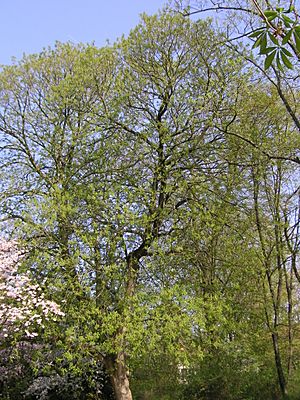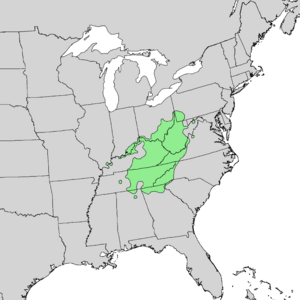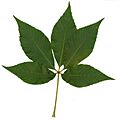Yellow buckeye facts for kids
Quick facts for kids Yellow buckeye |
|
|---|---|
 |
|
| Conservation status | |
| Scientific classification |
|
| Kingdom: | Plantae |
| Clade: | Tracheophytes |
| Clade: | Angiosperms |
| Clade: | Eudicots |
| Clade: | Rosids |
| Order: | Sapindales |
| Family: | Sapindaceae |
| Genus: | Aesculus |
| Species: |
A. flava
|
| Binomial name | |
| Aesculus flava |
|
 |
|
| Script error: The function "autoWithCaption" does not exist. | |
| Synonyms | |
|
Aesculus octandra |
|
Script error: No such module "Check for conflicting parameters".
The yellow buckeye (scientific name: Aesculus flava) is a type of tree that loses its leaves every year. It is also known as the common buckeye or sweet buckeye. This tree grows naturally in the eastern parts of the United States. You can find it especially around the Ohio Valley and in the Appalachian Mountains.
The yellow buckeye likes to grow in forests that have a good amount of moisture. It also grows in areas near rivers that sometimes flood. It can grow very tall, from about 20 meters (65 feet) up to 48 meters (154 feet). That's as tall as a 15-story building!
Contents
What the Yellow Buckeye Looks Like
The leaves of the yellow buckeye look like an open hand. They are called "palmately compound." This means several smaller leaves, called leaflets, grow from one central point. Each leaf usually has five leaflets, but sometimes it can have seven. These leaflets are about 10 to 25 centimeters (4 to 10 inches) long and wide.
In the spring, the tree produces many yellow to yellow-green flowers. These flowers grow in large clusters called "panicles." Each flower is about 2 to 3 centimeters (1 inch) long. Inside the flower, the pollen-producing parts (stamens) are shorter than the colorful petals. This is different from its relative, the Ohio buckeye.
The small branches (twigs) of the yellow buckeye have a faint smell. It is not as strong as the smell of the Ohio buckeye's twigs.
Fruits and Seeds
The fruit of the yellow buckeye is smooth and round or oval-shaped. It is about 5 to 7 centimeters (2 to 3 inches) across. Inside, there are usually one to three seeds. These seeds look like nuts and are about 2.5 to 3.5 centimeters (1 to 1.5 inches) wide. They are brown with a whitish mark at the bottom.
It is important to know that these fruits and seeds are poisonous to humans if eaten directly. However, Native Americans found a way to make them safe to eat. They used a special process to remove the harmful parts.
Growing Yellow Buckeye Trees
The yellow buckeye tree is often planted for its beauty. It is known as an "ornamental tree." People like to plant it in large gardens and parks. Its bright yellow flowers in spring are very pretty. In the autumn, its leaves turn a beautiful color, making it attractive.
This tree has received an important award called the Royal Horticultural Society's Award of Garden Merit. This award means it is an excellent plant for gardens.
How People Use Yellow Buckeye
Long ago, Native Americans used the seeds of the yellow buckeye. Even though the seeds are poisonous, they learned how to prepare them safely. They would roast the seeds and then soak them in water. This "leaching process" helped remove the toxic elements. After this, they could eat the seeds as food.
Photo gallery
See also
 In Spanish: Falso castaño amarillo para niños
In Spanish: Falso castaño amarillo para niños
 | Kyle Baker |
 | Joseph Yoakum |
 | Laura Wheeler Waring |
 | Henry Ossawa Tanner |






